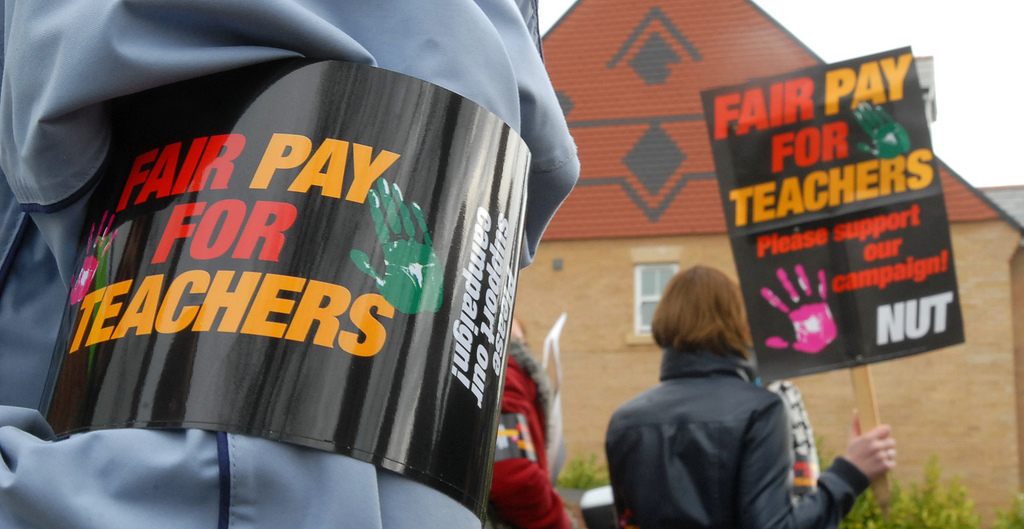
Ben Davis / Flickr
Teachers are ready to revolt. That’s the message we ought to take away from West Virginia, where educators in every county went on strike to demand better compensation. The teachers secured a major victory, including a 5 percent pay raise for state public employees.
The win could not be more well deserved. Teachers across the country are on the front lines of of some of the most pressing national battles, from the opioid crisis to the spate of school shootings.
In West Virginia, educators tackle those issues alongside high poverty rates and joblessness — and their wages have stagnated while health care costs have skyrocketed. All the while, proposals to deal with those rising costs — like askingteachers to download an app to monitor fitness activity or pay an additional insurance premium — only added to the indignity. These educators, predominantly women, stood up, said they’d had enough, and captured the imaginations of the workers around the country dealing with the same in their home states.
Though, of course, not everyone is thinking creatively. Chief among the naysayers: West Virginia Senate President Mitch Carmichael, who insists the money from the pay raises needs to be balanced with budget cuts. “These things come at a cost,” Carmichael said. Another Republican legislator warned the raises could come from the Medicaid budget, though Governor Jim Justice was quick to assure his constituents that won’t happen.
But the teachers’ raises don’t have to come at a cost to essential programs. In fact, years of tax cuts were responsible for defunding West Virginia’s education program in the first place. Over the last decade, the state slashed the corporate rate and did away with a host of other taxes, bringing down revenue by $425 million a year, the West Virginia Center on Budget and Policy estimates. Keep this in mind when legislators say it’s not fiscally responsible to pay public employees a decent salary.
The problem isn’t isolated to West Virginia. Plenty of other states have prioritized corporate interests, leaving schools underfunded. Oklahoma offered oil companies steep tax cuts, allowing for private wealth to prosper as the public sector, especially education, was gutted. The state slashed its per-pupil funding by more than 28 percent over the last decade, and dozens of districts only hold classes four days a week to keep costs down.
So it should come as no surprise that the momentum for a strike has spread to Oklahoma. The state’s educators have gone a decade without pay raises, leaving them with some of the lowest teacher salaries in the country. Like in West Virginia, Oklahoma teachers know where the money is. Educators in both states have suggested raising taxes on oil and gas production to fund raises.
Ensuring energy businesses pay the taxes they already owe would even be a good start. That shouldn’t be too difficult for Governor Justice, the billionaire coal heir and richest man in the West Virginia, to enforce. After all, his own family’s companies owe millions in taxes and penalties, and not just in his home state. Reporters in Kentucky, where teachers are also considering strikes, have pointed out that the missing millions he owes one county could make quite an impact in the school district’s budget shortfall.
But despite the revenue streams available to them, legislators are still hesitant to offer pay raises. Carmichael insists the issue is not as simple as it seems. “It’s easy to come in here and just vote for what people want, but that’s not what the general citizens expect of West Virginia,” Carmichael said.
So what does the legislature think its constituents expect?
Well, as teachers across West Virginia gathered to strike, the state legislature killed a bill that would have levied an additional 5 percent in severance tax for oil and natural gas companies. The bill would have diverted a percentage of the revenue raised into a fund for public employee insurance.
Meanwhile, lawmakers decided to move ahead on a controversial piece of legislation to expand the powers of natural gas and oil companies, even when their business is unwelcome. Rather than requiring 100 percent of mineral rights owners to consent to drilling, the new bill allows companies to move ahead with the resource extraction once 75 percent of owners have signed on.
That bill made headlines last month when a Democratic candidate for the legislature was ejected from a public hearing for naming the lawmakers taking money from fossil fuel companies. Of course, legislators also rejected an amendment to the bill that would’ve taxed the value of the produced natural resources and siphoned the money into the public employee insurance fund.
In Oklahoma, residents have grown tired of waiting for their government to fix the problem. Now, they’re circumventing the legislature entirely and pushing for a ballot measure in November to raise the funds for teachers’ raises. The group behind the proposal, which would increase the gross production tax on oil and gas from 2 percent up to 7 percent, expectsto see $330 million in revenue should the measure pass.
Perhaps it’s time to pose the question to Carmichael and the other state legislators across the country who slash taxes and cry funding crisis when it’s time to pay teachers: what do the general citizens expect from their states? A fully-funded education sector, or foolhardy allegiance to corporate energy interests? As West Virginia grapples with the answer, other states would be wise to learn the lesson, too. It’s clear that teachers around the country are already taking notes, and know there’s no reason to settle for less.
